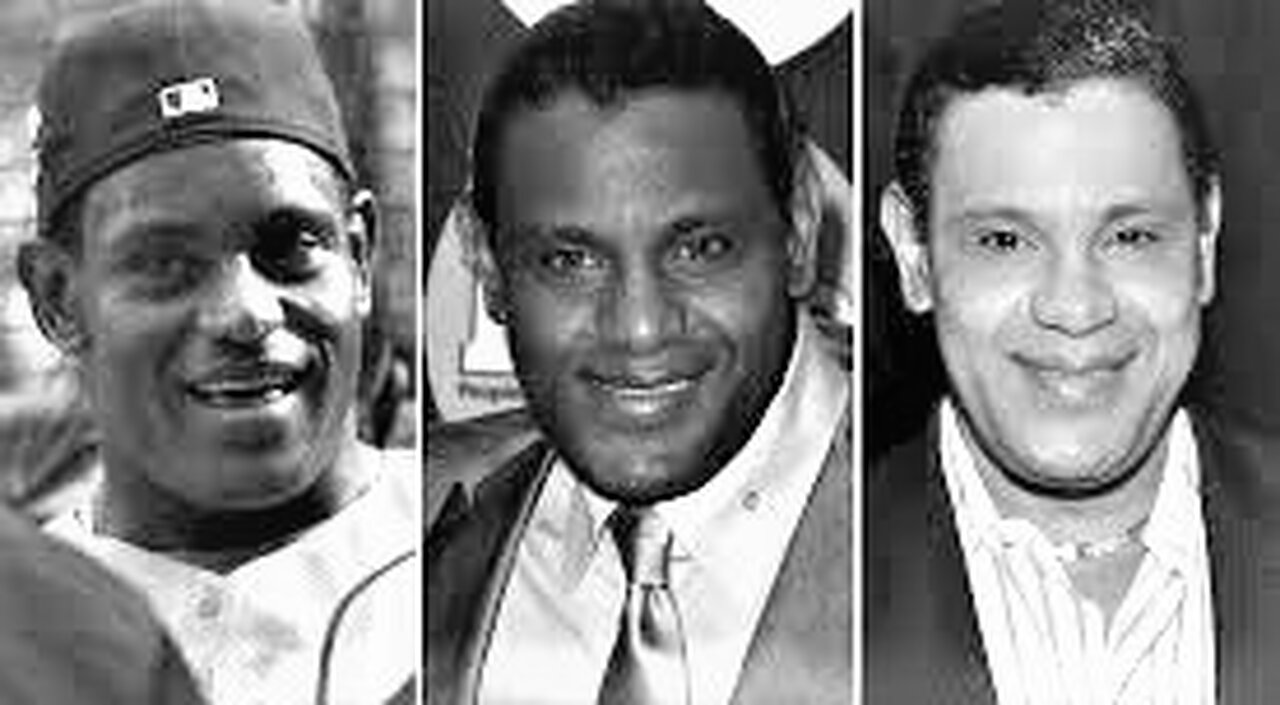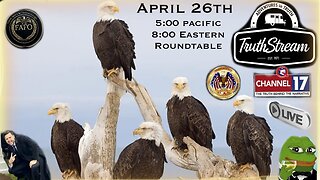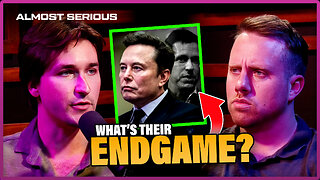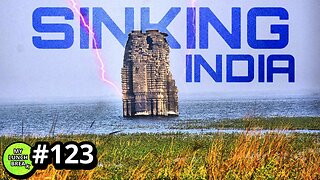Premium Only Content

Whites's Light Skin Magic/Satanism/Gnostizism/The Occult of Opposites: Black and White Dichotomy
Ronald Reagan often spoke of America’s divine purpose and of a mysterious plan behind the nation’s founding. “You can call it mysticism if you want to,” he told the Conservative Political Action Conference in 1974, “but I have always believed that there was some divine plan that placed this great continent between two oceans to be sought out by those who were possessed of an abiding love of freedom and a special kind of courage.” These were remarks to which Reagan often returned. He repeated them almost verbatim as president before a television audience of millions for the Statue of Liberty centenary on July 4, 1986.
When touching on such themes, Reagan echoed the work, and sometimes the phrasing, of occult scholar Manly P. Hall.
From the dawn of Hall’s career in the early 1920s until his death in 1990, the Los Angeles teacher wrote about America’s “secret destiny.” The United States, in Hall’s view, was a society that had been planned and founded by secret esoteric orders to spread enlightenment and liberty to the world.
In 1928, Hall attained underground fame when, at the remarkably young age of twenty-seven, he published "The Secret Teachings of All Ages," a massive codex to the mystical and esoteric philosophies of antiquity. Exploring subjects from Native American mythology to Pythagorean mathematics to the geometry of ancient Egypt, this encyclopedia arcana remains the unparalleled guidebook to ancient symbols and esoteric thought. "The Secret Teachings" won the admiration of figures ranging from General John Pershing to Elvis Presley. Novelist Dan Brown cites it as a key source.
After publishing his “Great Book,” Hall spent the rest of his life lecturing and writing within the walls of his Egypto-art deco campus, the Philosophical Research Society, in L.A.’s Griffith Park neighborhood. Hall called the place a “mystery school” in the mold of Pythagoras’s ancient academy.
It was there in 1944 that the occult thinker produced a short work, one little known beyond his immediate circle. This book, "The Secret Destiny of America," evidently caught the eye of Reagan, then a middling movie actor gravitating toward politics.
Hall’s concise volume described how America was the product of a “Great Plan” for religious liberty and self-governance, launched by a hidden order of ancient philosophers and secret societies. In one chapter, Hall described a rousing speech delivered by a mysterious “unknown speaker” before the signing of the Declaration of Independence. The “strange man,” wrote Hall, invisibly entered and exited the locked doors of the statehouse in Philadelphia on July 4, 1776, delivering an oration that bolstered the wavering spirits of the delegates. “God has given America to be free!” commanded the mysterious speaker, urging the men to overcome their fears of being hanged or beheaded, and to seal destiny by signing the great document. Newly emboldened, the delegates rushed forward to add their names. They looked to thank the stranger only to discover that he had vanished from the locked room. Was this, Hall wondered, “one of the agents of the secret Order, guarding and directing the destiny of America?”
At a 1957 commencement address at his alma mater Eureka College, Reagan, then a corporate spokesman for General Electric, sought to inspire students with this leaf from occult history. “This is a land of destiny,” Reagan said, “and our forefathers found their way here by some Divine system of selective service gathered here to fulfill a mission to advance man a further step in his climb from the swamps.” Reagan then retold (without naming a source) the tale of Hall’s unknown speaker. “When they turned to thank the speaker for his timely words,” Reagan concluded, “he couldn’t be found and to this day no one knows who he was or how he entered or left the guarded room.” Reagan revived the story in 1981, when Parade magazine asked the president for a personal essay on what July 4 meant to him. Presidential aide Michael Deaver delivered the piece with a note saying, “This Fourth of July message is the president’s own words and written initially in the president’s hand,” on a yellow pad at Camp David. Reagan retold the legend of the unknown speaker—this time using language very close to Hall’s own: “When they turned to thank him for his timely oratory, he was not to be found, nor could any be found who knew who he was or how he had come in or gone out through the locked and guarded doors.”
Where did Hall uncover the tale that inspired a president? The episode originated as “The Speech of the Unknown” in a collection of folkloric stories about America’s founding, published in 1847 under the title "Washington and His Generals, or Legends of the Revolution" by American social reformer and muckraker George Lippard. Lippard, a friend of Edgar Allan Poe, had a strong taste for the gothic—he cloaked his mystery man in a “dark robe.” He also tacitly acknowledged inventing the story: “The name of the Orator . . . is not definitely known. In this speech, it is my wish to compress some portion of the fiery eloquence of the time.”
For his part, Hall seemed to know almost nothing about the story’s point of origin. He had been given a copy of the “Speech of the Unknown” by a since-deceased secretary of the occult Theosophical Society, but with no bibliographical information other than its being from a “rare old volume of early American political speeches.” The speech appeared in 1938 in the Society’s journal, The Theosophist, with the sole note that it was “published in a rare volume of addresses, and known probably to only one in a million, even of American citizens.”
There are indications that Reagan and Hall may have personally met to discuss the story. In an element unique to Hall’s version, the mystic-writer (dubiously) attributed the tale of the unknown speaker to the writings of Thomas Jefferson. When Reagan addressed the Conservative Political Action Conference in Washington on January 25, 1974, he again told the story, but this time cited an attribution—of sorts. Reagan said the tale was told to him “some years ago” by “a writer, who happened to be an avid student of history. . . . I was told by this man that the story could be found in the writings of Jefferson. I confess, I never researched or made an effort to verify it.”
Whether the president and the occultist ever met, it is Hall’s language that unmistakably marks the Reagan telling.
Biographer Edmund Morris noted Reagan’s fondness for apocryphal tales and his “Dalíesque ability to bend reality to his own purposes.” Yet he added that the president’s stories “should be taken seriously because they represent core philosophy.” This influential (and sometimes inscrutable) president of the late twentieth century found an illustration of his core belief in America’s purpose within the pages of an occult work little known beyond its genre.
“Anything Is Possible”
During the 1980 president campaign, many Americans were electrified by Reagan’s depiction of America as a divinely ordained nation where anything could be willed into existence.
In announcing his candidacy in 1979, Reagan declared: “To me our country is a living, breathing presence, unimpressed by what others say is impossible. . . . If there is one thing we are sure of it is . . . that nothing is impossible, and that man is capable of improving his circumstances beyond what we are told is fact.” It was a vastly different kind of political oratory than the restrained, moralistic tones of his opponent, Jimmy Carter.
Through his reiteration of this theme of America’s destiny, and his powers as a communicator, Reagan shaped how Americans wanted to see themselves: as a portentous people possessed of the indomitable spirit to scale any height. This American self-perception could bitterly clash with reality in the face of a declining industrial base and falling middle-class wages. Nonetheless, the image that Reagan gave Americans of themselves—as a people always ushering in new dawns—formed the political template to which every president who followed him had to publicly adhere.
After Reagan, virtually every major campaign address included paeans to better tomorrows, from Bill Clinton’s invocation of “a place called Hope” (and his use of Fleetwood Mac’s “Don’t Stop Thinking About Tomorrow”), to Barack Obama’s “Yes, we can.” In his 2011 State of the Union address, Obama echoed one of Reagan’s signature lines when he declared: “This is a country where anything is possible.” The one recent president who complained that he couldn’t master “the vision thing,” George H. W. Bush, was not returned to office.
Political Psychology
In Reagan’s private life, positive thinking didn’t always allow for deep relationships. Reagan’s campaign aides and White House staffers were sometimes seriously hurt by the manner in which he would forget all about people and relationships that no longer suited a new phase or role in which he found himself. This was his habit in all areas of life—and it layered him with a kind of emotional buffer. While recovering from an operation for colon cancer in 1985, Reagan pointed out to Time magazine that he did not “have cancer”—rather he was a man who “had cancer,” past tense. “But it’s gone,” he explained, “along with the surrounding tissue. . . . So I am someone who does not have cancer.”
That is how Reagan dealt with almost every challenge: He found the terms to conceptualize himself in the strongest possible manner based on the demands of the moment. That talent could make him seem shallow and insincere, yet it allowed him to adapt in unexpected ways. Just as the young New Dealer of the 1930s transformed into the law-and-order conservative of the 1960s, so did the man who campaigned as a flinty Cold Warrior transform into a global peacemaker during his second term.
In the latter years of his presidency, Reagan was one of the few world figures who not only believed in the authenticity of glasnost and perestroika in the Soviet Union (as most conservatives at the time did not) but who possessed a vision of what the post-Soviet era would look like (as most liberals then did not). In a mixture of dream making and idealism, Reagan firmly believed that his “Star Wars” initiative would rid the world of the nuclear threat and open the borders of all nations to peaceful commerce and exchange.
For those who looked carefully, his global outlook had been foreshadowed during his Hollywood career. Soon after World War II, Reagan joined a group called the United World Federalists. The organization advocated a worldwide government organized along a United Nations–style system of rule making and dispute resolution. It was precisely the kind of “big picture” idea that excited Hollywood politicos of the mid-twentieth century (and that evokes deep suspicion in Tea Party activists of the twenty-first century). Globalist peacemaking touched something in Reagan’s earliest ideals. “I went through a period in college,” he later recalled, “in the aftermath of World War I, where I became a pacifist and thought the whole thing [i.e., the war] was a frame-up.”
Reagan’s penchant for science fiction has been widely noted. The United World Federalists could seem like the kind of universal government that sometimes showed up in sci-fi entertainment, like the United Federation of Planets in "Star Trek," or the Galactic Republic (replaced by the evil Galactic Empire) in the "Star Wars" movies. Perhaps not coincidentally, Reagan also spoke openly of his belief in UFOs for much of his life. According to family friend Lucille Ball, Reagan insisted in the 1950s that he and Nancy had a close brush with a flying saucer while they were driving down the coastal highway one night. The couple, Ball recalled, arrived almost an hour late for a Los Angeles dinner party at the home of actor William Holden. They came in “all out of breath and so excited” and proceeded to tell shocked friends about witnessing a UFO. As president, Reagan more than once assured Soviet premier Mikhail Gorbachev that an interstellar threat would unite U.S. and Soviet societies. Gorbachev honestly seemed perplexed as to whether Reagan was kidding, but ultimately decided he was not.
Reagan’s Irish ancestors might have called that side of him “barmy.” But this aspect of Reagan should not be dismissed as shallowness or mental weakness. Reagan thought in epic, picturesque terms—about the Soviet Union as “evil,” about himself as a man of “destiny,” about the mission of America as “mystical.” Reagan’s mother, Nelle, left him with a sense of enchantment about the power of big ideas. One of the ironies of twenty-first-century politics is how the nationalistic, anti-immigration activists of the Tea Party often extol Reagan as their hero. However passionately Reagan favored tax cutting or getting rid of “government waste,” his outlook was fundamentally globalist and even a touch utopian.
Reagan also inherited his mother’s passion for self-improvement. As a boy, he learned to read before starting school. He mastered scripts and later policy papers with rapidity. Critics thought Reagan was not a details man, but that wasn’t exactly correct. Reagan could voraciously digest information that tapped his enthusiasm; he ran on enthusiasm, and without it he was adrift. In adulthood he maintained reading habits that extended to seven daily newspapers. Reagan would never be caught dead on camera, unlike his avowed admirer Sarah Palin, unable to cite a daily paper he read or to identify a favorite Founding Father. Part of Reagan’s ire toward student activists while he was governor of California stemmed from how the small-town college boy in him felt an Oz-like wonder toward the University of California and the motto on its coat of arms: “Let There Be Light.” He resented those who he believed desecrated its intellectual opportunities.
It must also be said, however, that Reagan’s style was to read selectively and to question narrowly. As soon as he homed in on a position—such as his belief in massive welfare fraud—he would constantly happen upon fact after fact, usually in the form of stories or an offbeat statistic, to buttress his conviction. Campaign aides told of sometimes “misplacing” the chief’s favorite magazines in order to avoid his glomming on to a factoid—such as trees causing air pollution—that would later prove an embarrassment. If there is an adjunct to Reagan’s credo “Nothing is impossible,” it might be: If I believe it that makes it so. That outlook may have helped a poor Depression-era boy adopt a powerful (and needed) faith in self. But it could reflect a dangerous self-indulgence in the realm of policy making.
Reagan, Norman Vincent Peale, Napolean Hill, Dale Carnegie, and other positive thinkers had so thoroughly, and subtly, convinced the public over the course of decades that what you think is what matters most that by 2010 few objected or even noticed when New York’s Democratic senator Charles Schumer defended a scaled-down jobs creation bill by claiming that it was the very act of passage, rather than the policy particulars themselves, that made the difference: “. . . the longer I am around, I think it’s the market’s psychology that matters dramatically.” In substance, it was not much different from mental healer Phineas Quimby concluding a century and a half earlier: “Man’s happiness is in his belief.”
Manly P. Hall (1901-1990) is one of the names in the study of the esoteric, symbolic, and occult. His book The Secret Teachings of All Ages has been an underground classic since its publication in 1928. The Secret History of America expands on that legacy, offering a collection of Hall’s works—from books and journals to transcriptions of his lectures—all relating to the hidden past and unfolding future of our nation.
Hall believed that America was gifted with a unique purpose to explore and share principles of personal freedom, self-governance, and independent thought. PEN Award-winning historian, Mitch Horowitz has curated a powerful collection of Hall’s most influential and insightful works that capture and explore these ideas. Never before collected in one audiobook, the material in The Secret History of America explores the rich destiny, unseen history, and hidden meaning of America
Black and White Dichotomy
-
 4:17:17
4:17:17
VapinGamers
5 hours ago $1.25 earned📣 Fortnite Family Night! - Games and Dubs with BrianZGame - !rumbot
22.9K1 -
 LIVE
LIVE
ThePope_Live
4 hours agoLIVE - First time playing The Finals in over a YEAR! Still good? with @Arrowthorn
144 watching -
 3:06:26
3:06:26
TruthStream with Joe and Scott
10 hours agoRoundtable with Patriot Underground and News Treason Live 4/26 5pm pacific 8pm Eastern
31.8K25 -
 8:52
8:52
Tundra Tactical
7 hours ago $8.27 earnedSCOTUS Denies Appeal, Minnesota Courts Deal 2a Win!
38.3K8 -
 LIVE
LIVE
a12cat34dog
9 hours agoONE WITH THE DARK & SHADOWS :: The Elder Scrolls IV: Oblivion Remastered :: FIRST-TIME PLAYING {18+}
888 watching -
 22:27
22:27
Exploring With Nug
16 hours ago $12.16 earnedSwamp Yields a Chilling Discovery in 40-Year Search for Missing Man!
52.3K17 -
 1:23:26
1:23:26
RiftTV/Slightly Offensive
11 hours ago $10.96 earnedThe LUCRATIVE Side of Programming and the SECRETS of the "Tech Right" | Guest: Hunter Isaacson
61.9K16 -
 27:57
27:57
MYLUNCHBREAK CHANNEL PAGE
1 day agoDams Destroyed India
69.1K24 -
 LIVE
LIVE
Phyxicx
11 hours agoLast minute practice before Sunday - 4/26/2025
171 watching -
 LIVE
LIVE
The Official Steve Harvey
10 days ago $4.99 earned24 HOURS OF MOTIVATION w/ STEVE HARVEY
84 watching